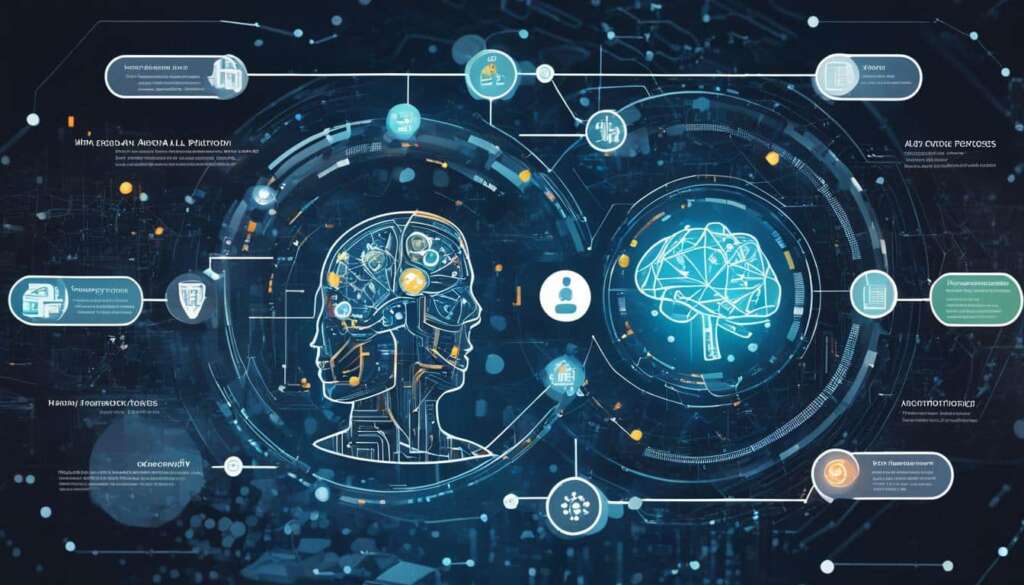Table of Contents
Artificial intelligence (AI) is poised to revolutionize economic development and drive growth in 2024. With advancements in AI technology, such as machine learning and automation, businesses are experiencing improved efficiency and productivity. This technological advancement is expected to have a significant impact, creating opportunities for job creation and enhancing overall business efficiency. The Central Bank of Ireland predicts a 2.5% growth in the domestic economy in 2024, attributing the increase to AI’s integration across various sectors.
The application of AI in economic growth forecasts presents a positive future outlook. Businesses can leverage AI to gain a competitive edge, streamline operations, and achieve sustainable growth. The possibilities for AI-led economic impact are vast, ranging from optimizing manufacturing processes to revolutionizing customer service. As AI becomes increasingly sophisticated, it will unlock new opportunities for businesses across industries.
Technological advancements, including AI, have consistently shaped the economy. Automation and machine learning are revolutionizing industries, enabling businesses to enhance productivity and make data-driven decisions. The integration of AI systems into existing operations improves efficiency, accuracy, and reduces costs. As AI continues to evolve and businesses embrace this transformative technology, the economic landscape will witness significant growth and innovation.
With AI playing a central role in economic development and growth, it is crucial for businesses to remain updated on the latest AI trends and strategies. Embracing AI is not only an opportunity for growth, but it is also essential for businesses to remain competitive in today’s fast-paced digital landscape. By harnessing AI’s potential, businesses can unlock new opportunities, fuel economic growth, and drive forward into a prosperous future.
The Impact of AI on Infrastructure Planning and Development
The transformative impact of AI extends beyond economic growth and is reshaping infrastructure planning and development. In the United Kingdom, both the Labour and Conservative parties are championing their reform agendas for infrastructure planning, recognizing the potential of AI in this domain.
Within the realm of infrastructure planning, the nationally significant infrastructure project (NSIP) planning process oversees large-scale projects related to transport, energy, water, and waste management. However, this process currently faces challenges in terms of efficiency and timeliness due to the complexity of project impacts and the involvement of multiple stakeholders.
Fortunately, AI is increasingly being leveraged to streamline the planning process by assessing schemes at a national level against policy criteria. By automating certain aspects of the process, AI can help expedite infrastructure development and enhance decision-making.
However, it is crucial to note that the policy framework supporting the NSIP has not kept pace with emerging issues such as climate change and environmental impacts. To address these concerns, reforms are being proposed to improve the pre-application stage, enhance consultation and engagement, and streamline the examination and decision-making process.
“By harnessing the power of AI in infrastructure planning, we can unlock substantial benefits, including improved project efficiency, enhanced sustainability, and minimized negative impacts.” – Jane Thompson, Infrastructure Planning Expert
The proposed reforms aim to ensure that infrastructure projects align with policy requirements, minimize their negative effects, and facilitate sustainable development.
Infrastructure investment plays a vital role in supporting economic growth, and the construction sector stands to benefit significantly from the integration of AI in planning and development. By harnessing AI’s capabilities, the sector can experience increased efficiency, reduced costs, and improved project outcomes.
AI’s Impact on the Construction Industry
The construction industry, known for its complex processes and large-scale projects, can derive numerous advantages from AI integration:
- Optimized project management: AI can help streamline project scheduling, resource allocation, and construction workflows, resulting in smoother operations and reduced delays.
- Improved safety: AI-powered technologies, such as wearable devices and autonomous vehicles, contribute to enhancing job site safety and preventing accidents.
- Enhanced design and planning: AI tools enable more accurate and efficient design simulations, 3D modeling, and predictive analytics, leading to better project outcomes.
- Better risk management: AI algorithms analyze vast amounts of data to identify potential risks and anticipate issues in construction projects, allowing for proactive mitigation strategies.
By capitalizing on AI’s capabilities, the construction sector can drive innovation, improve operational efficiency, and deliver sustainable infrastructure solutions.
To further illustrate the impact of AI on infrastructure planning and development, consider the following table:
| AI Applications in Infrastructure Planning and Development | Benefits |
|---|---|
| AI-powered data analysis and prediction models |
|
| Automation of planning processes |
|
| AI-enabled risk management |
|
| Smart monitoring and control systems |
|
Incorporating AI into infrastructure planning and development offers numerous benefits, ranging from increased efficiency and sustainability to enhanced project outcomes. As AI technology continues to advance, its role in shaping the future of infrastructure becomes increasingly vital.
The Global Aluminium Powder Market and the Role of AI
The global aluminium powder market is experiencing significant growth, with a projected market size of USD 2.70 billion by 2030. This growth is driven by the increasing demand from various industries, including construction, automotive, aerospace, and solar cell production. Aluminium powder is highly sought after for its desirable properties such as strength, flexibility, and lightweight, making it a preferred choice in these industries.
One of the popular production methods for aluminium powder involves spraying molten aluminium at high speed, resulting in a dense powder. This method ensures high-quality powder that meets the stringent requirements of downstream industries. However, the production process comes with its own challenges, such as optimizing production efficiency and maintaining quality control.
This is where AI plays a crucial role. Artificial intelligence is being employed to optimize production processes, improve quality control, and enhance efficiency in the downstream industries that rely on aluminium powder. AI algorithms analyze data, identify patterns, and make predictions, allowing manufacturers to streamline their operations and reduce costs. With the increasing adoption of AI, the global aluminium powder market is expected to witness continued growth in 2024 and beyond.
Furthermore, the construction sector is driving the demand for aluminium powder, especially in brick production. The use of aluminium powder in brick manufacturing enhances the bricks’ strength and durability, making them ideal for construction projects. Additionally, aluminium powder is also a key ingredient in solar cell production, as it helps in improving the efficiency of solar panels. As the construction and renewable energy sectors continue to expand, the demand for aluminium powder is expected to grow further, bolstering the market’s growth prospects.
FAQ
What is the role of AI in economic growth?
AI plays a crucial role in driving economic growth by improving business efficiency and productivity through advancements in machine learning and automation.
How is AI reshaping infrastructure planning and development?
AI is being increasingly utilized to rationalize the planning process for large infrastructure projects, such as transport, energy, water, and waste, by assessing schemes at a national level against policy criteria.
What reforms are being proposed for infrastructure planning?
Proposed reforms aim to improve the pre-application stage, enhance consultation and engagement, and streamline the examination and decision-making process to expedite infrastructure development and minimize negative impacts.
How is AI impacting the global aluminium powder market?
AI is playing a crucial role in optimizing production processes, improving quality control, and enhancing efficiency in downstream industries that rely on aluminium powder, contributing to the continued growth of the market.













